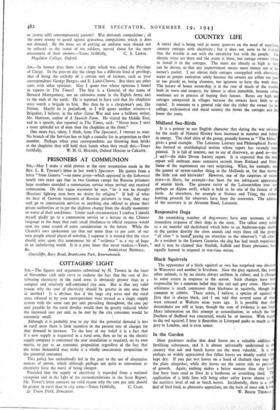COTTAGERS' LIGHT
Sra,—The figures and arguments submitted by H. Towers in the issue of November rzth only serve to endorse the fact that the cost of dis- tributing electricity in the rural areas is obviously greater than in a compact and relatively self-contained city area. But is that any valid reason why the cost of electricity should be greater in one area than in another? It is obvious that if the large city areas and the rural areas referred to by your correspondent were treated as a single supply system with the same rate per unit prevailing throughout, the cost per unit payable by the rural dweller would then be greatly reduced whilst the increased cost per unit to be met by the city, consumer would be extremely small.
Although it is probably true to say that the potential demand is less in rural areas there is little incentive in the present rate of charges for that demand to increase. To the best of my belief it is a fact that if a new supply is requested in a rural area, then so far as the electric supply company is concerned the new installation is required, on its own merits, to pay as an economic proposition regardless of the fact that the terms demanded may make it a wholly uneconomic proposition to the potential consumer.
This policy has undoubtedly led in the past to the use of alternative sources of power, which although perhaps not quite as convenient as electricity have the merit of being cheaper.
Provided that the supply of electricity is regarded from a national viewpoint and in the light of the recommendations in the Scott Report, Mr. Tower's letter contains no valid reason why the cost per unit should .
be greater in rural than in city areas.—Yours faithfully, C. CLAY. 21 Town Field, Doncaster.


























 Previous page
Previous page